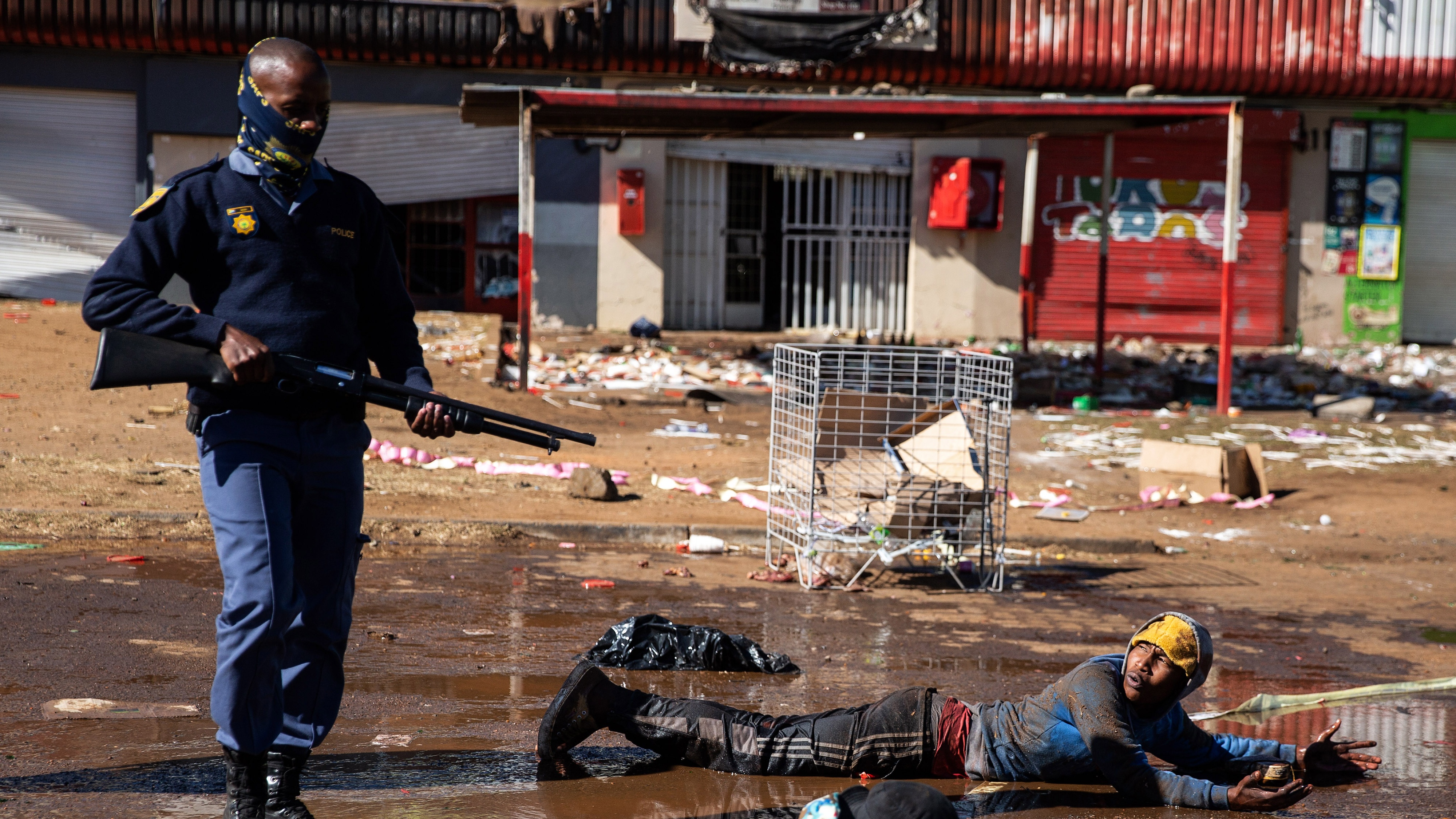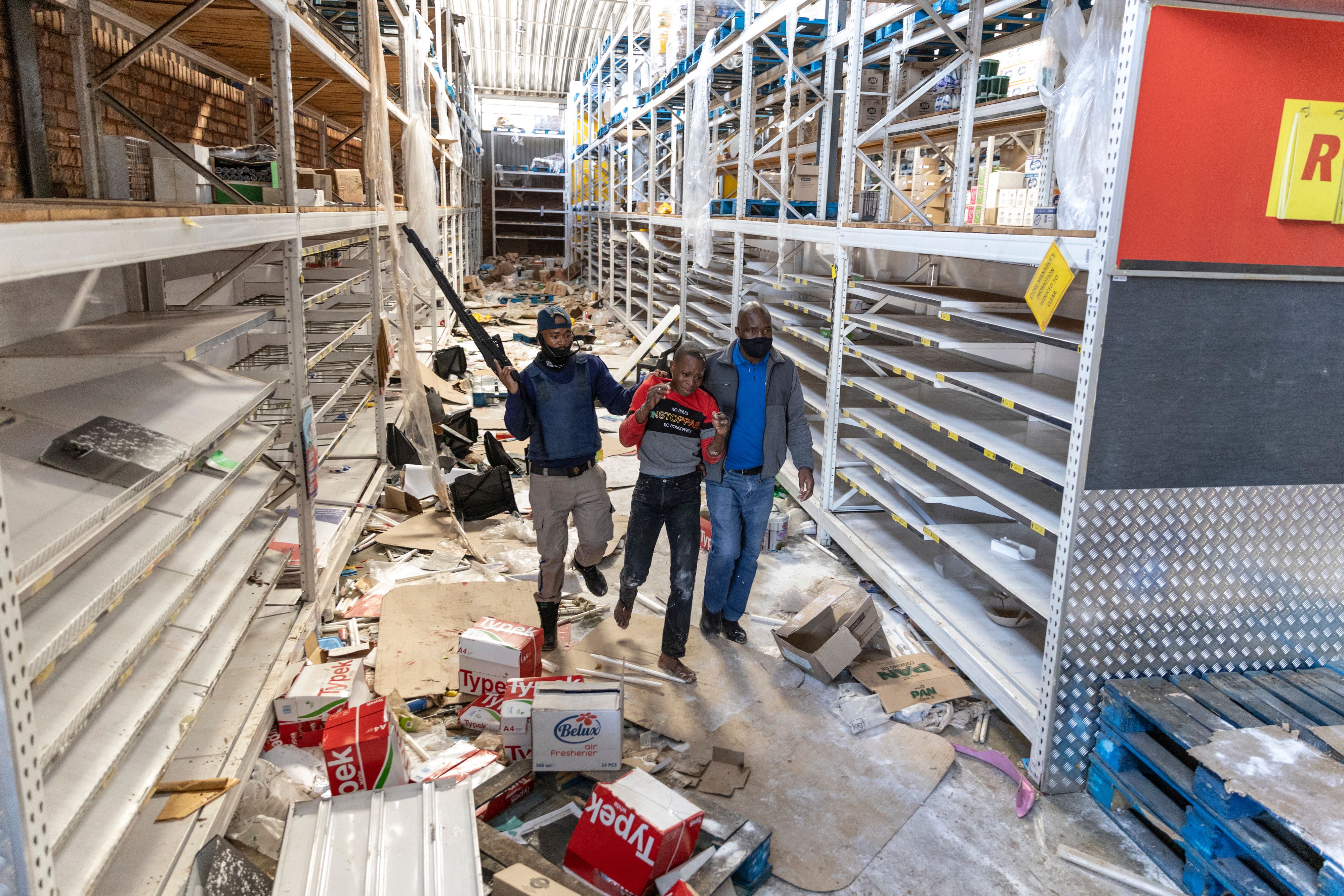‘Worst violence since apartheid’: everything you need to know about the South Africa riots
Jacob Zuma’s ‘private spy’ prime suspect in investigation into deadly civil unrest

A free daily email with the biggest news stories of the day – and the best features from TheWeek.com
You are now subscribed
Your newsletter sign-up was successful
Scores of people have been killed and crucial infrastructure brought to a grinding halt as looting and violence spreads across South Africa.
The unrest broke out after former president Jacob Zuma handed himself in to begin a 15-month prison sentence for contempt of court last week and has accelerated in recent days, with protesters in cities nationwide burning shopping centres and clashing with police.
Zuma’s supporters “believe the former leader is the victim of a political witch-hunt”, Sky News reports. Government investigators have linked former loyalists, including the ex-head of the country’s State Security Agency, to the escalating chaos.
The Week
Escape your echo chamber. Get the facts behind the news, plus analysis from multiple perspectives.

Sign up for The Week's Free Newsletters
From our morning news briefing to a weekly Good News Newsletter, get the best of The Week delivered directly to your inbox.
From our morning news briefing to a weekly Good News Newsletter, get the best of The Week delivered directly to your inbox.
The former president is accused of “industrial-scale state corruption” and his trial was viewed as a “critical test of post-apartheid South Africa’s commitment to upholding the rule of law”, writes The Times’ diplomatic correspondent Catherine Philp.
“Yet his imprisonment has led to the country exploding into the worst violence and lawlessness for years,” she adds. Zuma’s successor, President Cyril Ramaphosa, has accused him of “deliberately stoking the anger of Zulu nationalists”.
Philp agrees that “Zuma’s role in the violence is clear”. The foundation that represents him has described the deadly unrest as the “reactive righteous anger of the people... which others have characterised as violence”.
Ramaphosa has repeatedly appealed for calm, telling South Africans in a televised address to the nation: “This is not us.” But the ongoing violence is “underlining Ramaphosa’s weakness and his predecessor’s ability to foment disorder even from a prison cell”, says Philp.
A free daily email with the biggest news stories of the day – and the best features from TheWeek.com

In many ways, South Africa is engaged in a “war for the rule of law”, says The Economist, with “the rioters and their sponsors” attempting “to destroy the rule of law”, while “Ramaphosa, and all patriotic South Africans, must uphold it”.
The violence consuming the nation “is not a spontaneous protest” but was “incited, and in some cases perhaps instigated, by people close to the former president”, the paper continues. Their “narrow aim is to have him released”, while their wider intention is to “make the country ungovernable so as to undermine his successor”.
Indeed, Zuma “represents the ugly side” of the governing African National Congress (ANC), and “his supporters either tolerate corruption, or avidly indulge in it”. Ramaphosa, meanwhile, was appointed “to clean up the mess his predecessor left behind”.
As the death toll climbed to at least 117 on Thursday, the president sent in 25,000 members of the armed forces to aid police, “in the largest deployment of soldiers since the end of white minority rule in 1994”, The Independent reports. A reserve force of 12,000 troops has also been called up, with trucks, armoured personnel carriers and helicopters used to transport soldiers to “trouble spots”, the paper adds.
Ramaphosa must stand firm in the face of the growing pressure to release Zuma from jail, says the Financial Times’ chief foreign affairs commentator Gideon Rachman, who argues that “survival of democracy depends on an independent judiciary”. The jailed ex-leader’s “nine years in office saw a rapid growth in corruption”, Rachman writes, but “with Zuma’s imprisonment, the rebuilding can begin in earnest”.
“Because South Africa is a young democracy - with deep social and economic divisions - there was no guarantee the judiciary would survive the assault from Zuma and his allies,” he continues. “That the former president is in prison is a tribute to the robustness of the country’s legal system.”
All the same, Ramaphosa “faces a delicate balance”,says The Times’ Philp, who warns that “any violent confrontation between soldiers and rioters risks being spun by Zuma as a politically motivated crackdown”. However, “failing to halt the disorder will only exacerbate the daily hardships that have seen so many caught up in riots and looting”, she adds, so the government “can ill afford to let the violence spread still further out of control”.
Even with the ex-president behind bars, “many within the ANC still see Zuma as their leader, and his faction as their best chance for enrichment” from systematic corruption, says The Economist.
But with a growing number of South Africans questioning whether “the state is up to the task” of facing down his allies, “calls to release Zuma to stop the violence must be rejected with the disdain such ransom notes deserve”, the paper concludes.
-
 Epstein files topple law CEO, roil UK government
Epstein files topple law CEO, roil UK governmentSpeed Read Peter Mandelson, Britain’s former ambassador to the US, is caught up in the scandal
-
 Iran and US prepare to meet after skirmishes
Iran and US prepare to meet after skirmishesSpeed Read The incident comes amid heightened tensions in the Middle East
-
 Israel retrieves final hostage’s body from Gaza
Israel retrieves final hostage’s body from GazaSpeed Read The 24-year-old police officer was killed during the initial Hamas attack
-
 China’s Xi targets top general in growing purge
China’s Xi targets top general in growing purgeSpeed Read Zhang Youxia is being investigated over ‘grave violations’ of the law
-
 Panama and Canada are negotiating over a crucial copper mine
Panama and Canada are negotiating over a crucial copper mineIn the Spotlight Panama is set to make a final decision on the mine this summer
-
 Why Greenland’s natural resources are nearly impossible to mine
Why Greenland’s natural resources are nearly impossible to mineThe Explainer The country’s natural landscape makes the task extremely difficult
-
 Iran cuts internet as protests escalate
Iran cuts internet as protests escalateSpeed Reada Government buildings across the country have been set on fire
-
 US nabs ‘shadow’ tanker claimed by Russia
US nabs ‘shadow’ tanker claimed by RussiaSpeed Read The ship was one of two vessels seized by the US military


